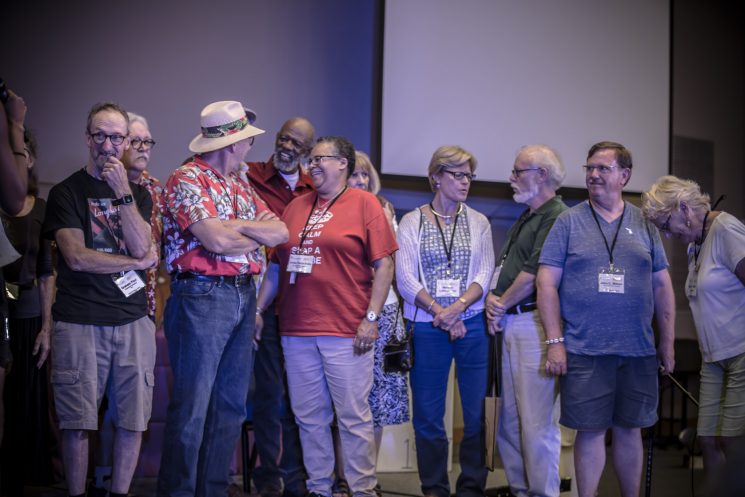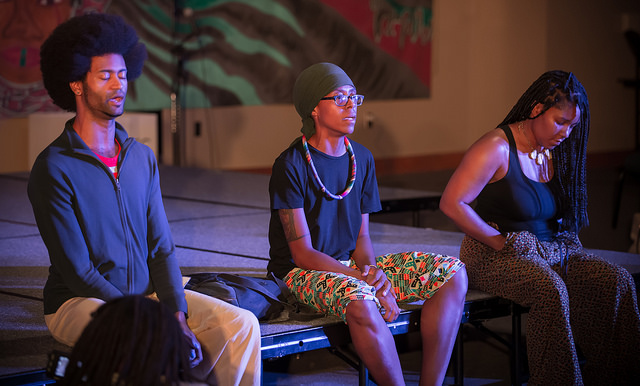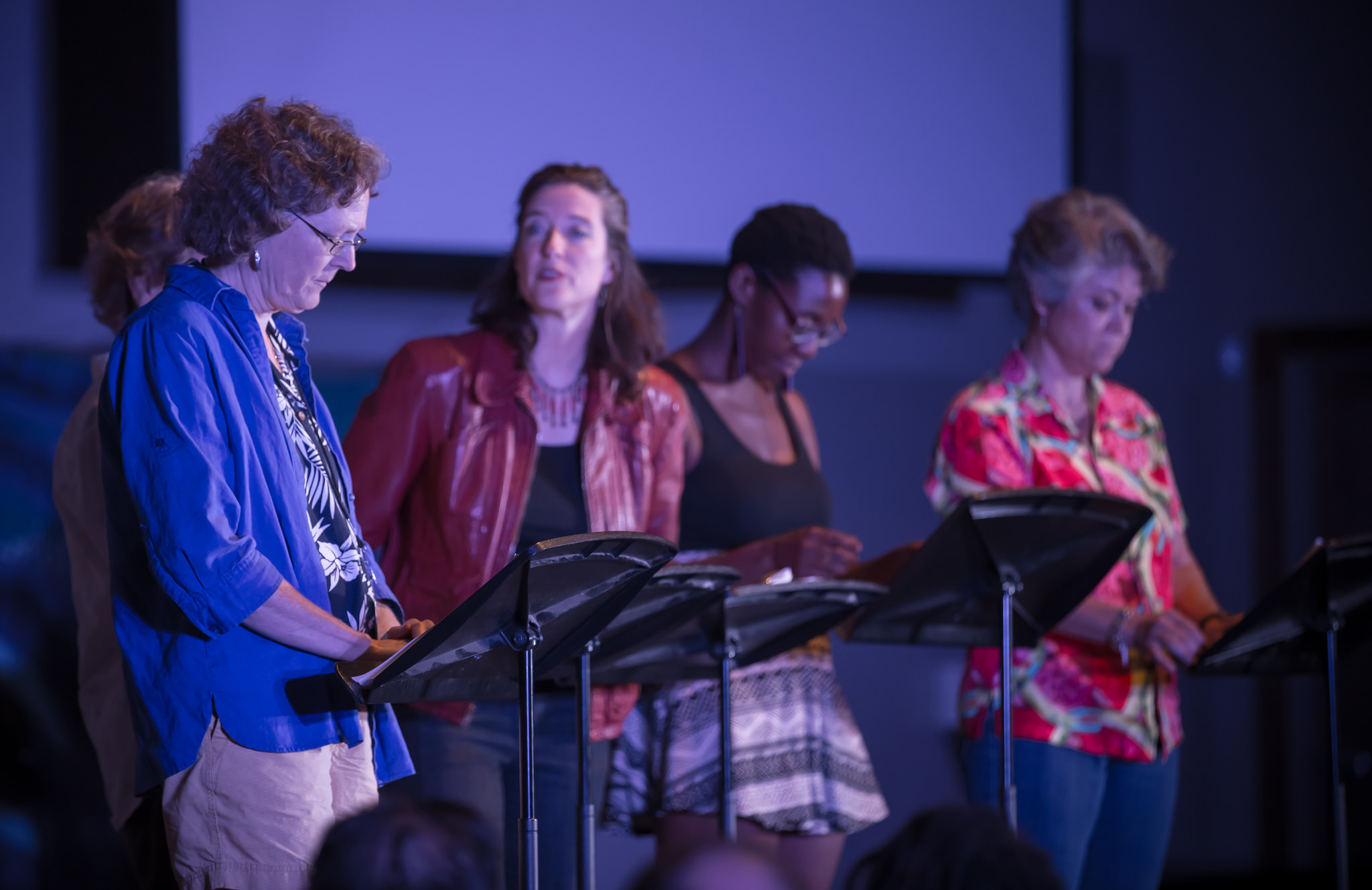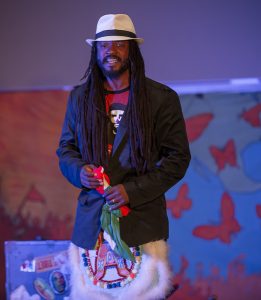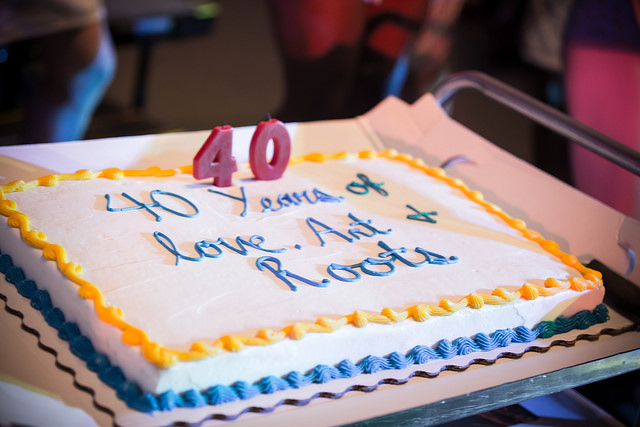Founding members of Alternate ROOTS. Photo by: Melisa Cardona
By Ashley Sparks | September 19, 2016
The late seventies and early 80s were seminal for U.S. theater history – especially southern theater history. In June 1976, a dynamic mix of theater artists from across the United States were in full on festival mode at the New Theatre Festival, hosted by the Baltimore Theater Project (BTP). This festival was a national gathering of “alternative” theaters whose work was “rarely seen outside of their communities” (i). A handful of southern artists from New Orleans and Tennessee were present, including The Play Group and Jo Carson.
Months later, many of those same artists gathered at Highlander under the invitation (or instigation, depending on who you ask) of Jo Carson. The birth of Alternate ROOTS happened and the coming years were a rush of festivals and gatherings, idea sharing and artist exchanges. Performers would float from one company to another – ensemble artists sharing practices, experiments in improv, vaudeville touring tips. It was a rich time of southern theater making.
In celebration of of ROOTS’ 40th anniversary, on the Friday night of ROOTS Week & Reunion, we went back to those ROOTS – our Regional Organization of Theaters South (ROOTS) roots. For the last 8 months Nicole Garneau and I have searched the bowels of the internet and Kathie deNobriga’s home, ROOTS’ archive, old member directories, and festival program books from the 70’s, to track down all of the founding members and companies listed in the bylaws. Early Friday evening we invited these founding members to come forward: Little Marrowbone Repair Corp., The Road Company, Roadside Theater, Florida Studio Theater, The Play Group, Carpetbag Theater, New World Theater Company, Free Southern Theater, Otrabanda Company, Margaret Gregg, Kelly Hill, and Robin Foster. It was bittersweet seeing this group of elders gathered for the first time in 40 years, re-unioning and re-membering, bringing our history back into the present and adding kindling to the deepest embers of the ROOTS fire. It was understood but not stated that, for some, this will be the last time they see one another. For some, whose memories are already eroding, they won’t remember the faces from this night, only the feelings.
While we are now a multidisciplinary organization it was important for us to honor our theater history.
What better way than through the form itself. (As a theater director, I own my bias in this programming choice!) I commissioned Will MacAdams to write a short play about the early years of ROOTS. Wading through archival audio, video, and poorly transcribed oral histories that I had done with 20+ elders, Will tackled the subject with humor and reverence. With Kathie deNobriga playing herself, Early ROOTS: A Play for Voices tells the history through the recounting of a dream from the wee-hours-of-Late-Night at ROOTS. The play successfully captures the fragmented history of an organization founded by artists who work in an ephemeral form.
The night premiered this new play and featured excerpts of 3 plays from ROOTS history: Jo Carson’s Daytrips, Rebecca Ranson’s Warren, and John O’Neal’s Junebug Jabbo Jones writings. These were not token history pieces, but instead humble homage to the artists and stories that laid the foundation for us to be in the room that night. Theater is an art form that lives only once and requires that we are breathing in a room in real time together. To celebrate and reflect on a few of the key stories woven into our social justice theater history, these plays needed to breathe and we needed to breathe them in.
It’s rare to be in a room that feels like theater history is hanging thick in the air – the making and the recreating of it. Like somehow you know that this night is a night for the records.
It’s rare to perform a scene based on the lived experience of a person in the room.
In Early ROOTS: A Play for Voices, Phil Cramer captured Dudley Cocke’s southern drawl and accentuated vocal cadence when he asked “What did you think of our [Roadside Theater’s] play?” and Marquetta Dupree’s imitation of John O’Neal’s honest and direct challenge to him was on point, “Well, it was delightful to watch the actors but, if what I hear about your work is true, then you have a lot of potential Klansmen in your audience. And I didn’t see anything in the show that would make a potential Klansmen any less likely to join the Klan.”
Or later on when Linda Parris-Bailey’s words – “There were people in Carpetbag who didn’t want to sleep in cabins or tents, take their clothes off and jump in the creek ” – spoken by her mentee and current company member, Jonathan Clark, were meet with an eruption of laughter.
We even had the actual tuxedo jacket from the Dungannon Dirty Disco as a prop (ii)!
It’s rare to have someone that originally performed in something perform it again 25+ years later.
Daytrips – written by ROOTS founder Jo Carson in 1988 – explores a southern family dealing with aging parents and the complications of dementia. Originally produced by The Road Company, Daytrips went on to have an extensive life at regional theaters across the country and won the Kesslering Prize.
In 1988, Christine Murdock played PAT, the caretaker of her mother REE, who has Alzheimer’s. At ROOTS Reunion, she performed the character of REE in the excerpted staged reading directed by Lisa Q. Mount. There shone through in her performance a depth, humor, grace, and presence that can only come from a performer that has 26 years of history with a story. As the memories of these early years have faded for some ROOTS members, performing a piece about dementia, was close to home.
It is a rare to have the opportunity to perform our elders’ history for them.
Warren, written by Pocket Theater company’s co-founder and playwright Rebecca Ranson in 1984, was one of the first plays written about AIDS. It is intimate and still timely. The Road Company’s founder Bob Leonard directed the excerpt performed at ROOTS Reunion. The play is named after Warren Johnston – one of ROOTS’ founding members who performed with Pocket Theater, Little Marrowbone Repair Corp. and The Road Company – and was written shortly following his AIDS-related death.
Warren was the first loss in the ROOTS community to AIDS. Sitting side-by-side, ROOTS founders Kelly Hill and Kathie deNobriga watched Patton White perform Kelly’s lived experience as his partner, Warren, received his AIDS diagnosis. How do we say goodbye to the ones we love? With a play to keep them alive. Rebecca is in the final stages of Alzheimer’s and was unable to join the Reunion festivities. How do we remember those who won’t remember us? By speaking their words out loud with love and authenticity.
It’s rarer still to perform your father’s words for an audience that knew those words when they were a first draft.
Writer, performer, and civil rights activist John O’Neal’s signature character Junebug Jabbo Jones came alive in the room incarnated through his 40-year old son William “Webo” O’Neal. From the darkness emerged the song Indian Red carrying the resonance of a man who has this character and song woven into his DNA. Wearing Junebug’s overalls and using his walking cane, Webo performed a collage of excerpts from John’s plays Don’t Start Me Talking or I’ll Tell You Everything I Know and You Can’t Judge a Book by Looking at it’s Cover.
Webo remembers coming to ROOTS as a child and watching performances, running through the woods, and lots of people sitting around talking. There were elders that remember Webo as a child being one of the youth staying up for Late Night. In the audience, John is glowing – a proud father – as Webo performs his words. Other elders are moved to tears because they remember when Webo was a child, and John was Junebug. The rhythms of Webo’s voice echo John’s – not like a child imitating his father, but like a grown man who carries his father’s lessons and talents in his pulse. And nonchalantly, on a Friday night in Arden, NC, it feels like theater history is happening. We are witness to living memory and Junebug is alive and well channeled through John’s DNA. Telling this history is about fighting for survival.
On a night of looking back we also took time to meditate and articulate the future. Muthi Reed and Angela Davis Johnson are multi-media artists that created The Hollerin’ Space at ROOTS Week – part-installation and part-participatory reflection space, it invited attendees to leave their own visions for the future. During Friday’s programming they prompted the audience to talk with the person beside them about how their work can support Black Lives Matter and Indigenous rights. In the midst of an evening of history we are still challenging ourselves to be active in the present: to commit to justice and write the songs and stories of this current civil rights battle.
ROOTS history is vital because it is the collective history of thousands of artists who have been working for social justice in the United States for over 40 years. We must make our own history visible. These southern stories will not be told by anyone else – no one else is running to house our archives, interview the elders before more memories are lost to the wrinkles of time and dementia, write the books, or document the complex truth. We have to do it ourselves, or it will be lost.
Our history is vital because the history of many of these artists has been lost, ignored, and grossly under-resourced. We have shaped the arts landscape in this country and impacted communities in ways that major markets never have. When critically acclaimed artists say “I think about, what would ROOTS say about this?” as a barometer of honest and challenging critique – it is because ROOTS sets the bar for socially conscious work.
For 40 years, ROOTS has been the primary network for social justice artists committed to a community of radical democratic creative practice. There is no other arts organization in the United States with a pulse as strong as Alternate ROOTS when it comes to the unswerving commitment to uprooting oppressions – in its myriad forms. It has been a place where we develop our skills as artists, organizers, allies; where we fail with love; and where we keep coming back because we are committed to the long haul of transforming ourselves, our art, our organizational practices, and our communities, to be more equitable, just, and beautiful.
Our history is vital because it inspires us to know that transformation and change is possible. If we can make our ROOTS community of practitioners infinitely diverse and still succeed at democracy AND build cultural equity, then it is possible for us to scale up!
The stories we told keep us, the original creators, and our history alive. We tell our own history. And we do it in the most ROOTS-y way possible through art, song, and making Late Night memories. We do it by continuing to gather in our southern mountains for years to come.
(i) Quoted from “The New Theatre Festival” by Richard Mennen in Educational Theatre Journal, (December 1976).
(ii) The audience missed out on this gem because an actor went up on a line. But in one of the boxes was the tuxedo jacket worn by Kelly Hill when the Little Marrowbone Repair Corporation served dinner wearing only aprons, jackets, and bow ties in 1981. We had even bought this beauty of a blue dildo that sadly didn’t get it’s cameo moment. (However, you’ll be relieved to know that it has since been donated to the Cocks Not Glocks project.) Here’s Kelly Hill’s memory of the Dungannon Dirty Disco:
“Little Marrowbone took charge of the evening meal at the annual meeting in Dungannon. As you (may) know, meal prep was part of the responsibility for all attending an annual meeting. Don Evans got Gil Trythall, a composer of electronic music and Dean of the Music Department at WVA, to compose a piece of music, which he did, and it was called the Dungannon Dirty Disco. We bought a load of tux jackets that were being discarded from a tux rental place in Nashville. We prepared a big salad for the meal and had these big stainless steel bowls to serve from. The crew then shed their clothes except for underwear (in most cases) donned the tux jackets and proceeded to dance the dirty disco. We got up on the tables and danced whilst throwing salad on everyone’s plate, or at least got close. It was great fun. Many comments were made about the quality of underwear worn. There may have been a woman or two but I don’t remember who all was there. Little Marrowbone was always fluid. Whomever wanted to do stuff was welcome. Just a by the way: Warren had just returned from Poland and it was the first time I had seen him in months. One of those things that help cement the memory.”
—

